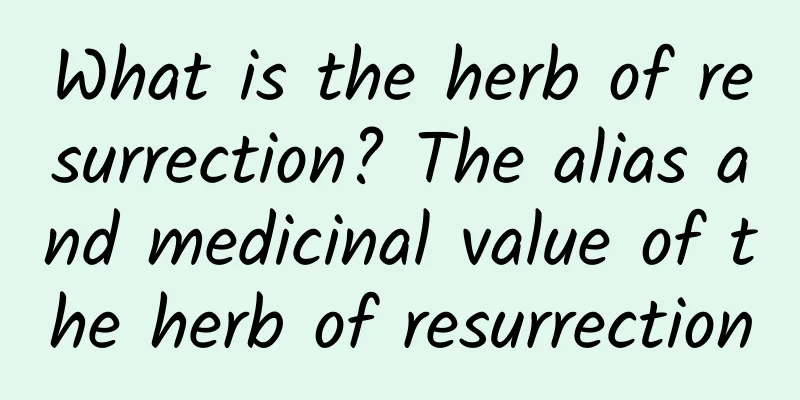What is the herb of resurrection? The alias and medicinal value of the herb of resurrection

|
The herb, also known as Aster, Qingwan, Ziqian, and Xiaobian, is the root and rhizome of the Aster plant of the Asteraceae family. It is recommended to take this Chinese medicine for long-term cough, dry cough, no phlegm or little phlegm. It can not only relieve cough and reduce phlegm, but also treat constipation and urinary retention. Origin of Resurrection GrassThe resurrection grass is produced in Hebei, Inner Mongolia, Northeast China, Shanxi, Henan, Anhui and other places. It grows in low mountain shady slope wetlands, mountain tops, low mountain grasslands and swamps at an altitude of 400 to 2000 meters. The appearance of the resurrection grassThe herb is a perennial herb with a short rhizome, densely growing numerous fine roots, and purple-red root bark. It has an erect stem, alternate single leaves, and a head-shaped inflorescence. Dig up in spring and autumn, remove the rhizomes and mud, braid them into braids and dry them in the sun, or dry them directly in the sun. The rhizome of the herb is irregularly lumpy, of varying sizes, with the remains of stems and leaves on the top, and is slightly hard. The rhizome is clustered with many fine roots, with a purple or grayish red surface, a slight fragrance, and a sweet and slightly bitter taste. The physiological effects of the herbThe herb belongs to the lung meridian and is mainly used to treat new and long-term coughs, coughs with excessive sputum, blood in the sputum, etc. The "Shennong Bencao Jing" says: "Aster tastes bitter and warm. It is used to treat coughs, shortness of breath, cold and heat in the chest, remove poison and atrophy, and calm the five internal organs." The taste of the herb is pungent and bitter, and it is warm in nature. It has the effects of moistening the lungs and relieving qi, eliminating phlegm and relieving cough. It is often used for new and long-term coughs, coughs with a lot of phlegm and wheezing, and blood in the sputum. It has multiple effects such as relieving cough and reducing phlegm, antibacterial, anti-tumor, antioxidant, laxative, and diuretic. Ingredients and effects of Resurrection GrassThe chemical components of the herb are rich, including terpenes and their glycosides, peptides, flavonoids, anthraquinones, coumarins, organic acids, phenols, sterols, volatile oils and phenylpropanoids, etc. The herb contains volatile oils, saponins and coumarin compounds. Among them, the saponins are mainly herb saponins, and it also contains herb ketone, quercetin, etc. Experiments have shown that the water decoction of resentment grass has an expectorant effect. In vitro, it has a certain inhibitory effect on Gram-negative intestinal pathogens such as Escherichia coli, Shigella dysenteriae, Proteus, Salmonella typhi, Salmonella paratyphi, Pseudomonas aeruginosa and Vibrio cholerae, and has an effect against pathogenic fungi. In addition, the water decoction of resentment grass has a significant inhibitory effect on influenza virus. |
<<: Can the golden branches and jade leaves be exposed to the rain? Are they afraid of the rain?
>>: When is the best time to bag pomegranates? Detailed explanation of bagging time and method
Recommend
The flower language and meaning of the dragon's spit, what are the taboos of giving it as a gift
1. Flower language and meaning 1. Precious and pu...
Efficacy and function of spiromicin
Abamectin is a compound insecticide that combines...
What is the best match for Hibiscus tea? Hibiscus tea pictures
1. Scented Tea Pairing 1. Chrysanthemum: When soa...
How to grow a plant that takes root so that it can bloom
1. When will it bloom? This plant can bloom, usua...
Is it easy to grow crape myrtle? How to grow crape myrtle and what are the precautions?
Is it easy to grow crape myrtle? The crape myrtle...
How to propagate Cyperus
Cyperus rotundus cutting propagation The cuttings...
Common varieties of water lilies
White Water Lily Originally produced in the Nile ...
How to cultivate hydroponic green radish to make it more vigorous?
Hydroponics of green radish is a simple and beaut...
When to plant lilies
1. Planting time You can choose spring or autumn ...
How often should orchids be watered in summer?
How often should orchids be watered in summer? Or...
Hydroponic method of Amaryllis
Hydroponics Method Ball Selection The key to the ...
Planting technology and management of Actinidia arguta
The cultivation of soft-fleshed kiwifruit was pre...
How to grow Bingmei succulent
How to raise Ice plum succulent is a plant of the...
The role and value of eyebright
Medicinal Value of Eyebright After being harveste...
How long is the growth cycle of chrysanthemum?
Introduction to Chrysanthemum Growth Chrysanthemu...









